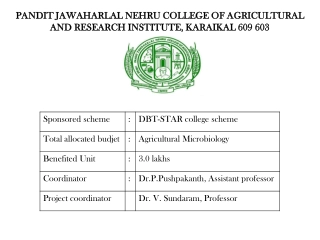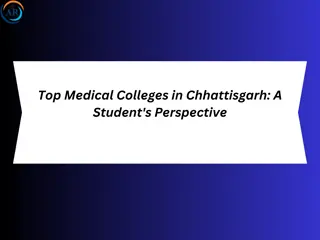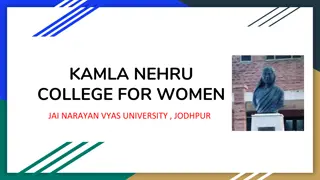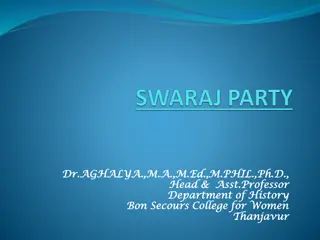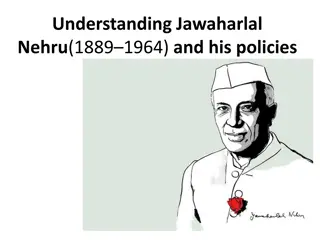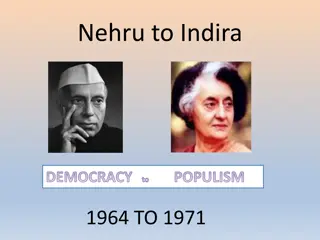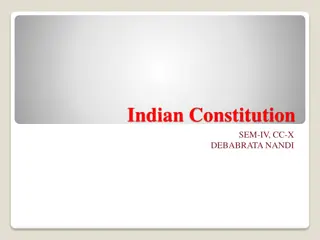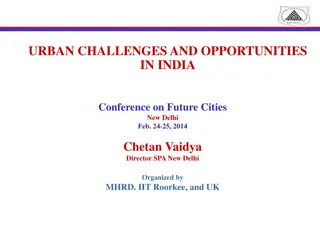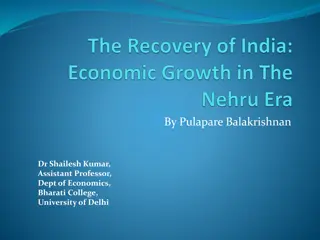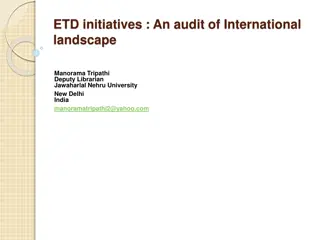Enhancing Agricultural Microbiology Education
The Pandit Jawaharlal Nehru College of Agricultural and Research Institute in Karaikal has been supported by the DBT-STAR college scheme to improve facilities, student exposure visits, introduce new practicals, and enhance faculty development in agricultural microbiology. Key Performance Indicators
1 views • 23 slides
MBBS in Chhattisgarh: A Comprehensive Guide
Pursuing an MBBS in Chhattisgarh offers reasonable, high-quality medical education with diverse clinical exposure. The state boasts reputable institutions like AIIMS Raipur, Pt. Jawahar Lal Nehru Memorial Medical College, and Government Medical College, Rajnandgaon. Admission is based on NEET-UG sco
2 views • 6 slides
Kamla Nehru College For Women - Empowering Education for Young Women
Founded in 1957, Kamla Nehru College for Women, affiliated with Jai Narain Vyas University, Jodhpur, has been a beacon of women's education in Western Rajasthan. Offering a wide range of academic programs and fostering holistic development, the college aims to empower young women to excel in various
1 views • 16 slides
The Swaraj Party: Formation, Background, and Aims
The Swaraj Party, a breakaway group from the Indian National Congress, was formed in 1923 by C.R. Das and Motilal Nehru following the withdrawal of the Non-Cooperation Movement. The party aimed for dominion status, autonomy, and self-rule, emphasizing control over bureaucracy and local bodies. The s
0 views • 12 slides
Jawaharlal Nehru: Visionary Leader and Architect of Modern India
Jawaharlal Nehru, a prominent leader of India's nationalist movement, played a crucial role in shaping the country's policies post-independence. As India's first Prime Minister, he focused on pillars like democracy, socialism, secularism, and nationalist unity. Nehru's domestic policies emphasized s
0 views • 8 slides
Political Dynamics and Challenges During Nehru and Indira Gandhi's Tenure
The period from Nehru to Indira Gandhi's leadership saw significant shifts in Indian politics. The Syndicate, comprising party bosses from Nehru's time, played a crucial role in decision-making. Lal Bahadur Shastri faced challenges like Naga insurgency, language debates, and the 1965 war with Pakist
0 views • 13 slides
Evolution of the Indian Constitution: A Historic Journey
With 395 articles and 12 schedules, the Indian Constitution, effective since January 1950, is one of the world's longest. Framed over three years from December 1946 to December 1949, the Constituent Assembly painstakingly discussed and refined drafts clause by clause. The history of the Constitution
0 views • 16 slides
Urban Challenges and Opportunities in India: Strategies for Future Cities
This content discusses the urban challenges and opportunities in India, focusing on population trends, urban initiatives, and the Jawaharlal Nehru National Urban Renewal Mission (JNNURM). It emphasizes the need for sustainable, inclusive, and smart cities with strategies such as improving urban gove
0 views • 8 slides
Exploring the Nehru Era: Growth Patterns and Economic Strategies
Investigate the growth patterns during the Nehru Era (1950-1964), highlighting the different views on its impact, including the Nehru-Mahalanobis model and Vakil-Brahmananda plan. The era saw debates on whether it was a wasted period or a period of growth due to factors like growth transition and st
0 views • 15 slides
ETD Initiatives: An International Audit of Electronic Theses and Dissertations
This audit by Manorama Tripathi from Jawaharlal Nehru University in India explores Electronic Theses and Dissertations (ETD) initiatives in India, the UK, and Australia. It covers the importance, advantages, research methodology, objectives, educational landscape in India, and the role of the Univer
0 views • 25 slides
